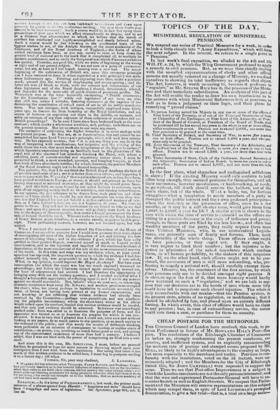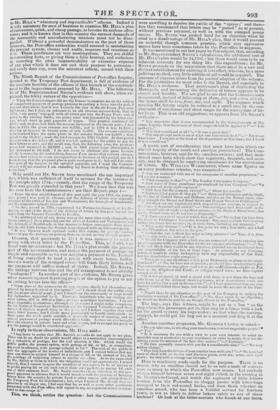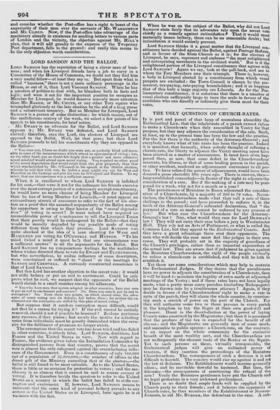CHEAP POSTAGE FOR THE METROPOLIS.
THE Common Council of London have resolved, this week, to pes thaw Parliament in favour of Mr. ROWLAND HILL'S Post-office plan. The resolutions of the Edinburgh Chamber of Commerce lie before us, strongly condemning the present cumbrous, ex- pensive, and inefficient system, and as explicitly recommending the uniform rate of postage and stamped covers proposed by Mr. HILL, as likely to be highly advantageous to the country at large, but more especially to the merchant and trader. Petitions in con- fortuity with the resolutions, voted on the 3d instant, were un- animously adopted ; and the Members for the City of Edinburgh (mind this, Sir JOHN CAMPBELL) were requested to support the same. Thus we see that Post-office Improvement is a subject in which the London merchants are not the only persons interested ; and that the wise and experienced Postmaster-General will have to en- counter Scotch as well as English theorists. We suspect that Parlia- ment and the Ministers will receive representations on this subject which may compel them, in spite of Lord LIcurtELD's prompted denunciation, to give a fair trial—that is, a trial on a large scale- to Mr. HILL'S " visionary and inipructiaNen scheme. Indeed it is only neceisary for men of business to examine Mr. Hues plan
of convenient, quick, and cheap postage, to become its zealous advo-
cates; and it is known that in this country the earnest demands of the mercantile and manufacturing interests must not be disre- garded. Without a powerful demonstration on the part of those interests, the Peat-office authorities would succeed in maintaining the present system, clumsy and costly, insecure and vexatious as
it is. These gentlemen are very unscrupulous. They are skilful
in concealing facts, or giving them a false bearing, and audacious in asserting the utter impracticability or excessive expense
of any plan which it does not suit their purpose to patronize : and rarely does any, even the minutest reform, accord with their notions.
The Ninth Report of the Commissioners of Post-office Inquiry, devoted to the Twopenny Post department, is full of evidence of the resolute hostility of the officers of that branch of the establish- ment to the improvement proposed by Mr. HILL. The following bit of Mr. Superintendent SMITH'S evidence will show, when ex- plained, the tricky nature of the opposition- " When the Commissioners did me the honour to examine me on the subject of compulsory payment of postage previous to putting a letter into the post, I was not then aware that it was formerly the case in the old Penny Post este- Hisleuent ; but I find, on reference to an old revenue account-book, that in 1774, 4 one penny ' was paid with all letters put into the Penny Post ; and, if
go -
iee to the country limits, one pennv more was demanded by the letter.ear :lea which went in part payment of wages. This practice continued till roe; and, to show how little the revenue increased in the twenty years, I fuel that, in l 774, the gross revenue was 8.2761., and in 1794 it was 11,768/. ; showing an increase in twenty years of only 3,4921. The amount calculated to he received from tl:e extra pence in the country limits was 2,500/. ; this, ridded to the 11,76E4., made the total revenue for 1784 14,268/. At that period the restriction wne taken off, and it was left optional for the public to pay fur their letters or not ; and the result was' that, the following year, the gross re- venue had inereaeed to 22,0991. ; and, in 1801 (seven years afterwards), it Lad increased to 38.422/. I do not mean to attribute this great increase wholly taremoring the restrictions, because I ant aware that various circum- stone..s had (alma to cause correspondence to increase at this period, nor do I mean to sae that the proposed plan is quite analogous to it; but still I do attri- bu:e teat of the increase to the optional payment, and I trust the Commis- sioners will not consider I am exceeding my limits in drawing their attention to the feet."
Why could not Mr. SMITH have mentioned the one important fart, which was sufficient of itself to account for the increase in the receipts after 1794,—namely, that the range of the Twopenny Post was greatly extended in that year? We learn that this was the case hem the Commissioners : see their Report, page -I- " Rom the first establishment of this post until the year 1794, the postage (mie penny) was paid in advance, and the delivery of letters was originally comined to the cities of London and Westminster, the borough of Southwark, and the respective suburbs thereof.
"An Act, passed in 1791, empowered the Postmaster-General, at his dis- cretien, to extend the limits of the delivery of letters by this poet beyond ten milee from the General Post-office in London.
"An additional rate of one penny was at the same time made chargeable on hum conveyed from places beyond the cities of London and Westminster and the borough of Southwark, in like manner as letters conveyed 1,) these places Lad, by the Fifth George the Second, been charged with an additional penny. " It was likewise made optional, under this statute, for persons seu,iiii letters to pay the postage, on putting them in, or not, as they thiseght proper."
Observe, that previously to I 7'2 4 it was necessary Is) send a penny with every letter to the Po:it-office. This, ttL) doubt, was found very inconvenient : but Mr. HILL'S plan avoids the gee; to part of the inconvenience, and mates the payment of postage as simple and agreeable as we can imagine a payment to be. Instead of being compelled to send a penny with every letter, half-a- crown's worth of the stamped cover:; will frank thirty letters, and one payment will suffive instead of thirty. Indeed, Mr. SMITH, the analogy between this and the old arrangement is not strictly "analogous !" In another part of the evidence, Mr. SMITH gives other reasons against depriving people of the option to pay or not on putting letters into the office- " What class of the community do you suppose chiefly feel themselves ag. grieved by being deprived of this option ? "—" I should think the middle class and the poorer class of people ;: and I should say the community at large would feel themselves aggrieved by it. There are individuals who are sending cir- cular letters, 400 or 500 at a time ; perhaps sometimes institutions. I do not mean charitable institutions ; although in teas cases I might make exceptions, for the National Benevolent Institution and the Licensed Victuallers send their notices of election unpaid twice in the ye tr, and I believe together they send neatly 8000 letters; but I allude more particulatly to benefit institutions: in these eases the Berk sends monthly or qmolerlv notices of meeting, and to compel payment of postage would affict their fetish. Letters are also brought front the country by private hand and other means, and to compel the party to pay the postage would be considered oppieseise."
In reply to these observations, Mr. Mu. said-
" I beg leave to notice that Mr. Smith's re:narks do not apply to my plan. There can be no doubt the public would object to a restriction unaccompanied by a reduction of postage, but the real question is this: which would the public prefer, the present option, with postage of 2d. or 3d., or compulsory payment in advance, with postage reduced to Id.? The wish of the public is only the aggregate of the wishes of individuals, and I cannot believe that any man can desire to subject himself to a charge of 2d. or 3d. instead of Id., for the privilege of subjecting others to similar extertion. As to the cases cited by 111r. Smith as those in which the obligation would act oppressively, I would remark, that I cannot imagine the members of any society to be so unwise as to prefer paying 2d. or 3d. each out of their own pullets, to paying Id. each out of their common fund. Mr. Smith considers it an objection to the pi 0- posed payment in advance that it would interfere with the practice of bringing letters from the country by private hand or other memo!, and giving them ie the Twopenny Post fur distribution ; but, when I remind Mr. Smith that the practice is an illegal one, I feel sure that he, as well :ms every other gentleman connected with the Post.office, will rejoice in any arraugetneut which is calcu- lated to discourage it."
This, we think, settles the question: but the Commissioners
were unwilling to deprive the public of the " option ;" and there- fore they recommend that letters may be "posted" as at present, without previous payment, as well as with the stamped penny covers. Mr. ,SMITH was pushed hard for an objection when he cited as a disadvantage of Mr. HILL'S plan, that it would prevent an unlawful though common practice, which very oppressive means have been sometimes taken by the Post-office to suppress. It was mentioned in our last paper on this subject, that, according to Mr. Superintendent SMITH s calculations, the additional cost of Mr. HILL's plan would be 34,7391.: but there would seem to be no inherent necessity for any thing like this expenditure; for Mr. SMITH proceeds on the supposition that there must be a new and distinct establishment for carrying it into effect, whereas, by a more judicious method, very little additional aid would be required. The increase of expense arises from the partial adoption of the scheme. For the particulars we must refer to the Report, and especially to Mr. HILL's evidence. That gentleman's plan of districting the Metropolis and increasing the deliveries of letters appears to be simple and feasible. We are glad to see that the Cemmissimers recommend. instead of delivering at three, five, and J•32'ell o'clock, the hours shall be two, four, six, and eight. The expense which terrifies Mr. SMITH might be reduced to a small sum by tha em- ployment of omnibuses and short stages for the conveyance of let- ter-bags. This is an old suggestion; as appears from Mr. SMITH'S evidence- " You remember that it was recommended by the Commi,,ioners of P‘e- venue Inquiry, that the owners of short stages shuuld be applied to?"—" I do perfectly. '
" Was that considered at all ?"—" It was a great deal."
s' Was any attempt made to see at what rate they would do it ?"—" Not to may knowledge. I was not at the head of the department at that time; but I know it was considered."
A pretty sort of consideration that must have been which ex- cluded inquiry of the coach and omnibus proprietots! The Com- missioners, however, sent for the omnibus-owners; and they men- tioned some facts which show that regularity, despatch, and secu- rity, may be obtained by employing omnibuses for the conveyance of letters. Mr. WILLIAM WARBURTON, whose name figures on so many ponderous vehicles, was examined- " You are connected with one of the companies of omnibus proprietors:"— Cu I a:n the manager." ii aVhat company is that ?"—" The London Conveyance Company."
" How many of those omnibuses are employed by that Compaq ?"—" We have at present forty-eight employed."
" !low long has the company existed ?"—" About ten months." " Between what points do they ply ?"—" Between Paddington and the Bank,
by the line of Oxford Street and Holborn, and also on the Strand route, run- n;:ee through the Strand and Bond Street and Regeut Street to Paddington." " Are there are any regulations with respect to your coaches, in respect to the times of departure and arrival ?"—" Ora carriages start from right in the
till time at aight every three minutes on the Oxfufd Street route, bat oa Ow Strand route we do nut run so frequently." " 1- there any rate of speed at which they go?"—" We reckon the time from the Ilenk to Paddington thirty-five minutes : they must yerform their journey within the thirty-five minutes, or, at most, forty, including any stoppages." " What is the distance?"—" It is five miles we run ; four miles and a half to tits Wheatsheaf, five miles to the gate."
" to that the rate is about five miles in forty minutes :"—" Yes ; it is front eV; to nine utiles Cu hour at hest."
•• Could the Company with which you are connected ob3ect to mitering into an neringement with the Post-office for the conveyance of letter-bags ?"—o No, I do not think there would be any objection, provided we can be relieved from any responsibility of the loss of those bags. At present, as our Company stands, it would be rather awkward to have any responsibility of that kind, lest the shareholdels might complain." " Yon have nut any omnibuses which gn to Richmond, or places in the neigh- 'mutinied ?"—" No, we have not at present ; we should have no objection to puts Hug our omnibuses on any given road not out far asfliehniond,—as far as Ful- ham or the Elephant and Castle, or villages round town ; we have capital enough to do it.' "If it was proposed to send a guard with them, to put down the bags and take them up at the different receiving-houses, whit convenience could you have for giving him a seat in the omnibus ?"—" i have uuderstood that our con- ductors would deliver those bags, but would be made the servante of the Post- office."
" Would there be any objection on the pert of the Company to making the conductor a servant of the Post-uffice?"—" No, there could be no objection ; he would no doubt be paid by us, though chueen by the Poet-office."
The bags, says this witness, might bo put in a box " on the step where the passengers get in, that step on a hinge with a lock for the guard to carry his bags under; so that when the carriage stopped, he could get his bag out in a moment and drop it at the office."
Another omnibus proprietor, Mr. GEORGE CLOUD, is asked- " Do you take care, iu selecting your conductors, to select respectable people ? • —" Yes."
" Is it necessary for you with a view to your own interest, to select re- spectable men as conductors to your omnibuses, in order to secure their not de- ceiving you in the amount of the fares they receive ? "—" Certainly." " Do they generally remain with you for a considerable time? We very seldom change." " How long have the drivers of your coaches been with you ? "—" We have lend some of them with us tWelre and fourteen years, some six, seven, and eight years ; we very seldom change our servants."
Here is machinery ready-made for the purpose. There is no reason why an omnibus should not be as safe a mode of convey- ance as nanny to which the Post-office now trusts. Let anybody station himself between seven and eight o'clock in the evening in St. :`.1artin's-le-Crand, and watch the regiment of little fellows issuing from the Post-office on shaggy ponies with letter-bags strapped to their red-coated backs, and then think whether an omnibus guard, who has been a faithful servant for fourteen years, is nut as likely to deliver letters safely as any of those urchins? Or look at the letter-carriers who knock at our doors,
and consider whether the Post-office has a right to boast of the superiority of their men over the servants of Mr. WARBURTON and Mr. CLOUD. Now, if the Post-office take advantage of the machinery already in existence for sending letters to various parts of London and the vicinity, the objection against Mr. Hat's plan, that it will add greatly to the expense of the Twopenny Post department, falls to the ground: and really this seems to be the only objection worth consideration.




























 Previous page
Previous page